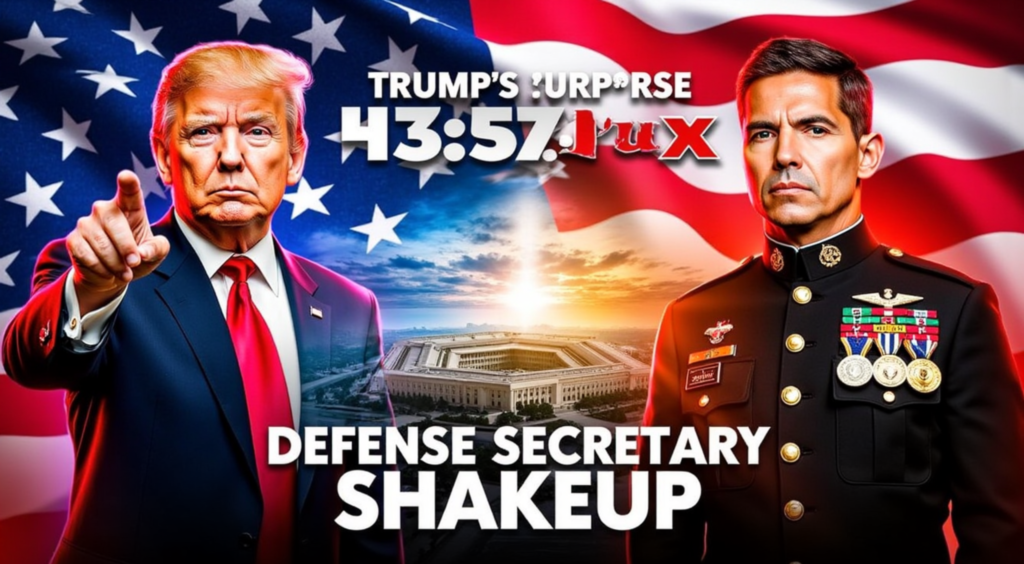Former President Donald Trump shocked the political world when he nominated Pete Hegseth, host of Fox News and veteran of military and combat services, to become the future Secretary of Defense. Made on the declaration has driven the American military in a direction where people wonder what kind of policies Hegseth would adopt at the Pentagon. Beyond the military, media, and political commentary backgrounds that Hegseth has belonged to is that his appointment says much about where America’s defense strategy will go, concerning military policy, and the relationship between the executive and the armed forces.
Pete Hegseth: A Brief Background
In order to understand the impacts that the appointment of Hegseth as Defense Secretary will carry, one must be a little familiar with who he is and what his background constitutes.
Pete Hegseth most widely pops into mind as being one of the hosts of the immensely popular morning television program on Fox News, Fox & Friends Weekend. Hegseth went to Fox News in 2014 after being distinguished by a good career in the military and public service. He was an officer in the U.S. Army and was rotated several times into Iraq and Afghanistan.
Hegseth started his leadership career in the military service, particularly when he was a captain, and on veterans’ affairs issues.
Besides his military career, Hegseth has also been outspoken for conservative political views. His commentaries on politics usually emphasize strong national defense, limited government.It firm support for the U.S. military. While mixing these ingredients of military experience, media presenc
e, and a foundation established on political ideology, Hegseth has emerged as a household name in right-wing circles, which has entrenched him in his position as an incendiary yet influential voice shaping public opinion on defense and military policy.
Role of Secretary of Defense
The Secretary of Defense is one of the most valued posts in the U.S. government. The Secretary is the head of the Department of Defense (DoD), and it has responsibility for managing the entire U.S. armed forces, which include the Army, the Navy, the Air Force, and the Marine Corps. Some of the basic duties of the role include advising the president on military matters, implementing defense policy and managing the day-to-day operations of the DoD. The Secretary plays a very important role in developing defense strategy, military readiness, and ensuring the U.S. military remains poised to respond to evolving threats.
Coming as it does at the most trying time or in the most difficult situation, this incumbent needs deep knowledge of military strategy, international relations, and leadership. It comes little in surprise, then, that Hegseth’s nomination has caused some raised eyebrows and is placed under a microscope for his non-traditional advancement to this position.
What Hegseth Brings to the Table
His military veteran experience obviously provides a strength for his nomination. Having been in and out of many combat zones- Iraq and Afghanistan-to name a few, he brings firsthand experience of war, leadership in the military, and what service members need. His military background positions him well in terms of speaking to the challenges that U.S. troops face on the ground as well as strategic challenges posed by maintaining global military superiority.

However, what made his nomination interesting was his media presence and political stance. As a commentator on the Fox News Network, he has often demanded a more aggressive foreign policy, emphasizing massive military intervention and pro-actively aggressive behavior against such threats from terrorism, China, and Russia. Indeed, positions almost at par with the Donald Trump “America First” agenda, stressing military strength, national security, and a robust defense posture.
Hegseth is also a strong advocate for veterans and has written extensively on the importance of standing behind U.S. military personnel after serving. His leadership in military outreach and veteran affairs may bring a much-needed new focus to the often-overlooked issues of veterans’ healthcare, benefits, and civilian reintegration.
Implications for U.S. Military Policy
If confirmed, Hegseth will probably bring quite a few changes to the U.S. military policy. Military readiness appears to be one of the key areas that he is going to focus on, particularly because he has been very vocal about modernizing the U.S. military and keeping the armed forces prepared to meet emerging threats. This will involve further investment in emerging technologies- cyber defense, artificial intelligence, unmanned systems, and intensification of U.S. military involvement in core regions, such as the Indo-Pacific.
The Pentagon can expect a shift toward a more aggressive foreign policy with Hegseth at the helm. Because the Trump administration has already started with deterrence and military strength, the United States might move aggressively in handling its adversaries, especially China and Russia.
More broadly, another important domain in which Hegseth’s imprint may be evidenced is military intervention in civil politics. Throughout Hegseth’s journalistic career, he has maintained that U.S. military needs to be significantly more in step with the political objectives of the executive branch. This would likely include a greater emphasis on taking a strong military stance on behalf of Trump’s overall policy platform-from building the southern wall to taking a hardline position on immigration and national security.
Ironically, the nomination of Hegseth also sparked a great deal of criticism. According to them, his media personality background rather than being an experienced military strategist or policymaker tends to position him inadequately for the top-level task of Pentagon management and oversight of U.S. military operation in the rest of the world. They argue Hegseth’s support for more aggressive military intervention, particularly into the Middle East, would push the US even further into expensive wars.
However, politically outspoken stands and partisan words combined with combat experience do indicate that Hegseth may not understand how to balance the needs of a military mission with the political priorities of the executive branch. The traditional expectation is that the Department of Defense shall remain apolitical, and close ties to conservative media and the Trump administration may raise questions about the potential politicization of military decisions.
Conclusion
President Donald Trump has selected an interesting but controversial figure in Pete Hegseth as his preferred Defense Secretary. He will probably mould the U.S. military policy with the individual, who shares the same political vision and commitment to strong national defence. Being a man of military and, at the same time, conservative political view, media presence, Hegseth is unconventional but interesting candidate for that post.
While his leadership at the Pentagon may spell a more aggressive policy of U.S. military action, his success will largely depend on how well he can balance his preparedness militarily with political priorities in navigating this complex landscape of global security. All eyes will turn to Hegseth as he navigates the confirmation process toward whether he can usher the Department of Defense into a new era of American military strength and global influence.



